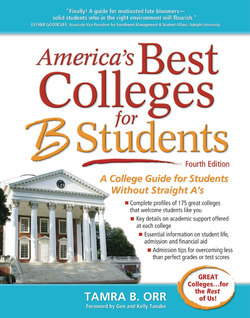Читать книгу America's Best Colleges for B Students - Tamra B. Orr - Страница 53
На сайте Литреса книга снята с продажи.
DON’T JUST TALK ABOUT YOU
ОглавлениеSince the interviewers are real people, they value real conversations. Which would you prefer: listening to a one-hour soliloquy with Socratic references on the merits of academia as perceived through the eyes of an 18-year-old, or participating in an intriguing conversation about current events, life experiences and personal opinions? Needless to say, interviewers prefer the latter as well.
Throughout your interviews, remind yourself that your goal is to achieve two-way conversation. Be careful of any interview where the subject is you and you dominate the interview talking about your accomplishments. Don’t worry about trying to mention all your achievements—your interviewer will ask about them. At the same time, however, this is not the only thing the interview is about.
Common sense tells us that most people enjoy talking about themselves, and interviewers are no different. Your interviewers volunteered for this job because they enjoyed their college experience and they like talking to potential students. Interviewers are usually the kind of people who love to give advice to young prospects. Think of this as a time not only for your interviewers to learn about you but also for you to find out as much as you can about them and their experiences.
Reprinted with permission from Get into Any College by Gen and Kelly Tanabe
Who will ask you these questions? It depends on the college. It may be an admissions officer, another student, faculty member, alumnus or panel of interviewers.
Keep in mind that a college interview is usually more like a casual chat over coffee, not a white-light-in-your-face interrogation. If you have a good sense of humor, the interview is the time to show it. If you have a talent, skill or ability that just did not fit on the application form or in your essay, speak now or forever hold your peace. If you can, find out if the interview is considered to be informational (just getting some facts about you and a time for questions and answers) or evaluative (part of the admissions criteria).
Feeling nervous as you go into the interview is understandable. In a way, it is a good thing because it will give you that extra boost of adrenaline you need to keep on your toes and pay attention. A person who isn’t at least a little bit nervous may not do as well as one who is!
To make this less of a stressful event, practice what you are going to say ahead of time. Entertain your friends and family with it. Speak in front of the mirror or to an understanding guidance counselor. Prepare an answer for all the possible questions so you are ready, no matter which one the officer may ask.
The bottom line of the interview is simple—it is not the end all, be all of the admissions process. It will not usually make or break your acceptance. The person talking to you is a human being and may well have gone through the exact same thing you are going through right now. This means you will glimpse some compassion, empathy and even a smile during the interview. Relax, take a few deep breaths and let the special person that you are shine out!
According to the people at www.collegeboard.com, there are 13 things to avoid in a college interview. Are you paying attention? Here they are!
Don’t:
Be late
Memorize speeches—instead sound natural and conversational
Ask questions covered by the college catalog
Chew gum
Wear lots of cologne or perfume
Swear or use too much slang
Be arrogant—there’s a fine line between being confident and boasting
Lie—it will come back to haunt you
Respond with only “yes” or “no” answers
Tell the school it’s your safety or last choice
Be rude to the receptionist or any other staff you meet
Bring a parent into the interview
Refuse an interview
